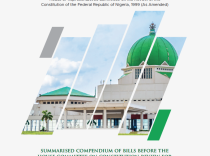The Senate at its plenary session of Thursday, 1 February, 2018, passed the Emergency Powers (Repeal and Re-enactment) Bill, 2018 (SB 182) which seeks to repeal the Emergency Powers Act 1961 and enact the Emergency Powers Act, 2018 to provide for the declaration of a State of Emergency.
Presenting the report of the Committee on Judiciary, Human Rights and Legal Matters on the Bill, Chairman, Sen. David Umaru (APC: Niger) informed the Senate that the objective of the Bill was to provide for an elaborate procedure for the declaration of a state of Emergency in Nigeria; general administration of an emergency area with respect to search, arrest without warrant, detention of persons and imposition of curfew; effective control of arms and explosives in emergency areas; and payment of compensation and other reliefs to persons affected by orders made by the President in areas of emergency.
Sen. Umaru mentioned that the Committee had received memoranda and conducted a public hearing on the bill in order to avail stakeholders and the general public the opportunity to make input through oral presentations. He listed the key stakeholders to include:
- The Federal Ministry of Justice
- The Nigerian law Commission
- The Nigerian Army
- The Nigerian Navy
- The Nigerian Air Force
- Department of State Services
- National Human Rights Commission (NHRC)
- The Nigerian Securities and Civil Defence Corps (NSCDC)
- Institute for Peace and Conflict Resolution
- Policy and Legal Advocacy Centre (PLAC); among others.
Following submissions from stakeholders at the public hearing, the Committee observed that:
- The Emergency Powers Ac,t 1961 had become obsolete and could no longer address emerging security situations in the country;
- The passage of the new Bill would address the security challenges that had arisen in the country as a result of security threats and agitation in some parts of the country;
- The enactment of the Act, is necessary for the preservation of public peace and safety of citizens in affected areas; and
- That various stakeholders had unanimously supported the passage of the Bill.
In his concluding remarks, he stated that the Bill would further confer on the National Assembly the powers to decide whether the proclamation of a State of Emergency by the President should remain in force or not after the President has presented before the National Assembly facts and circumstances leading to the declaration.





